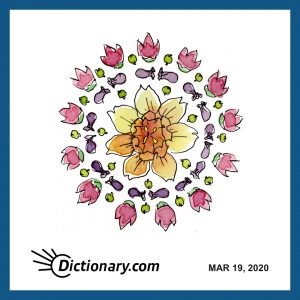Word of the Day
primaveral
adjective
of, in, or pertaining to the early springtime.
More about primaveral
The adjective primaveral is a derivative of the noun primavera “spring (the season),” found in just about all the Romance languages: Italian (end of the 12th century), Catalan (13th century), Spanish (14th century), and Portuguese (16th century); even Romanian has primăvară. The Romance forms ultimately derive from the Latin neuter plural adjective and noun phrase prīma vēra, literally “first springs.” It is common for Latin neuter plural nouns to become feminine singulars in Romance, e.g., Latin gaudia “delights, joys,” becoming singular joie in French and gioia in Italian. Primaveral entered English in the 19th century.

how is primaveral used?
Crocuses planted in clusters or in thick rows, or scattered on banks, have a brilliant effect in the sunshine of a bright primaveral day.
It is the urge of Spring—the primaveral force that inspires the young and mocks the aged.
primaveral


lunker
noun
something unusually large for its kind.
More about lunker
The noun lunker has two meanings: something large and unruly, and a large game fish, especially a bass. It was originally an Americanism, and its etymology is obscure: lunk, lunkhead, and clunker have all been suggested. Lunker entered English in the second half of the 19th century.
how is lunker used?
Do black holes, such as the lunker in our own Milky Way Galaxy … drive the evolution of galaxies around them; or do galaxies naturally nurture the gravitational gobblers at their centers … ?
As sure as I’m standing here, ten pounds; what a little lunker for a first baby.
lunker


More about greenth
Greenth, “green growth,” was coined by the English author and politician Horace Walpole, who also coined blueth and gloomth. Greenth, blueth, and gloomth all entered English simultaneously in the mid-18th century.
how is greenth used?
I found my garden brown and bare, but these rains have recovered the greenth.
Imagine a rambling, patchy house … the mellow darkness of its conical roof surmounted by a weather-cock making an agreeable object either amidst the gleams and greenth of summer or the low-hanging clouds and snowy branches of winter …
greenth





